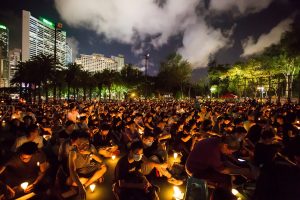On Tuesday, Hong Kong authorities announced that they had arrested six people for posting “seditious” messages on social media. According to local media reports, those arrested include Chow Hang-tung, a prominent human rights lawyer who was already behind bars, and the posts in question concerned the commemoration of the 1989 Tiananmen Square massacre.
The Chinese Communist Party’s domestic censorship surrounding the events of June 1989, when the military crushed pro-democracy protests in Beijing and elsewhere, is well known internationally. Its efforts have been so thorough that most young people in China today have no idea that the massacre ever happened, even though the image of the “Tank Man” has become an instantly recognizable symbol of resistance outside the country.
For three decades, Hong Kong was the only place within China where talking about the atrocity was allowed. But now the same erasure of Tiananmen is underway in the former British colony of 7 million people.
The recent arrests were the Hong Kong government’s first application of the Safeguarding National Security Ordinance, or Article 23, which was adopted in March by the Legislative Council. The council itself, once a place of vigorous debate, has been reduced to a rubber-stamp body in the years since Beijing imposed its own draconian National Security Law (NSL) on the territory in July 2020. During the same period, Hong Kong authorities have pursued a crackdown on free speech with astounding speed and intensity, all under the guise of “national security.”
Beijing’s determination to crush Hong Kong’s freedoms and to erase history is illustrated by the multiple, years-long prosecutions against Chow. However, Chow’s courage and resolve in the face of this repression exemplify Hong Kongers’ collective determination to fight back.
Chow has been in custody since September 2021, when police arrested her for “inciting subversion” under the NSL. At the time, she was the vice chair of the Hong Kong Alliance in Support of Patriotic Democratic Movements of China, which had been the organizer of the annual Tiananmen Square massacre vigil on June 4 at Victoria Park since the first anniversary in 1990.
Authorities banned the vigil for the first time in 2020, citing public health restrictions related to COVID-19. Despite the ban, thousands lit candles across Hong Kong in 2020. Smaller crowds did the same when the ban was repeated in 2021.
In December 2021 and January 2022, Chow was sentenced to a total of 22 months in prison for “taking part” and “inciting others to take part” in the unauthorized vigils under Hong Kong’s Public Order Ordinance. In March 2023, she received another four-and-a-half months for failing to provide authorities with information on the Alliance under the NSL.
While the main prosecution against Chow for “inciting subversion” under the NSL, for which she faces up to 10 years in prison, is still pending, authorities have now added the new charge of “sedition” under Article 23, which carries a maximum sentence of seven years.
The alleged seditious messages that “incited hatred” were posts on a Facebook page called “ChowHangTungClub.” Apparently written by Chow, they explain how she became involved with the Alliance. Chow’s mother was one of the seven people arrested. The Hong Kong government’s cruel guilt-by-association tactics are consistent with a long-running practice on the mainland.
The fact that the authorities keep throwing new charges at Chow for the one thing she did – organize commemorations to honor those killed by their government for peacefully demanding freedom and democracy – only speaks to the insecurity that she inspires in her own government and in Beijing.
While others arrested under the NSL chose to plead guilty and accepted gag orders in exchange for shorter prison sentences or bail releases, Chow refuses to be silenced even behind bars. She wrote in a 2021 letter from her cell to her supporters: “I reject [the characterization of me as] unfortunate… It is actually a great fortune to be able to fight for one’s own ideas. How many people in the world have such an opportunity? Against the biggest communist dictatorship in the world, no less. What a challenge.”
The last time I saw Chow Hang-tung was in a crowded restaurant in Hong Kong at the end of 2019, when local pro-democracy protests were raging. I’ve forgotten what we said to each other, but I will always remember the self-assurance and serenity that radiated from someone who knew she was doing the right thing.

































